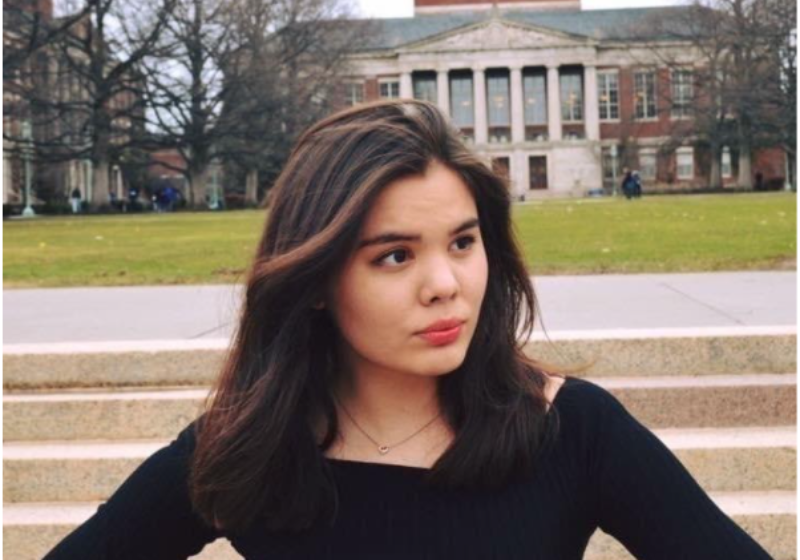Eleanor Lenoe entered UR determined not to study history. “I come from three generations of history professors, so I actually started in bio[logy].”
Four years later, Lenoe is graduating with a degree in History (and a second one in Japanese) after auditing HIST 189, a course titled “Wives, Witches, and Wenches” taught by Brianna Theobald. “I was so excited during the class that Prof[essor] Theobald took me aside […] urged me to take the class [for credit]— she inspired me to eventually switch to history!” she wrote in an email to the Campus Times.
When Lenoe’s not rock climbing or putting hours in at the Writing and Speaking Center, Lenoe works at Rare Books in Rush Rhees Library, where she has access to endless historical archives. With an internship at the Smithsonian National Museum of American History lined up for the summer of 2020, Lenoe was excited to delve into history. “But when COVID[-19] hit, the Smithsonian closed indefinitely, and so I couldn’t remotely do research there or at UR, because I couldn’t access [archives] remotely.”
In the meantime, Lenoe embarked on her own personal project, studying the Second Wave Feminist Movement. “Ever since I was a kid, my grandma has had a really big group of very vibrant friends. I [wanted] to learn more about how different the world was for women in the ‘60s, ‘70s, and ‘80s. […] I interviewed women to discover how the second wave feminist movement impacted their personal lives, development, and relationships,” Lenoe said.
It was also a good excuse to talk to her grandma, who she missed.
Folding chairs in and masks in hand, Lenoe embarked on her journey from Rochester, N.Y. to Andover, Mass. to interview her grandmother and grandmother’s friends. Through her research, she’d discovered a “gap” in the existing scholarship. Previously conducted oral history projects in the United States about the American Second Wave Feminist Movement focused predominantly on women who were at the forefront of the movement.
Therefore prominent feminists, like Shulamith Firestone (the founder of New York Radical Feminists), were in the spotlight while “everyday women” were excluded.
This observation inspired her to create a publicly accessible online oral history archive with information on the Second Wave Feminism and the role of ordinary women.
Most importantly, there is no fee, a barrier that kept Lenoe from accessing several resources in her search. “ I think anybody should be able to access scholarly sources,” Lenoe said.“That was my goal.”
For up to five hours a day, she interviewed six women between ages 60-89. She was pleased to interview Japanese American women as well. The women discussed how “tumultuous” American society was for women in the years between the ‘60s and late ‘80s.
At that time, the “cookie-cutter image” of what a woman was supposed to be was upended and completely changed. Women found themselves able to discover themselves in ways previously unavailable to them due to societal roles and limitations, such as the requirement to have children. “This forced women who weren’t directly involved in the movement to go on a journey that may not have happened one or two decades earlier,”
Lenoe was fascinated. She discovered that women who had children during the 1970s peak of the movement had come to “regret their parenting,” since they believed they did not spend as much time “parenting or paying attention” to their children due to radical influences from the social movement.
According to their own diagnostics, Lenoe found that the oldest of the women was the “best parent,” since her children were older, too. The youngest of the six was also along the “best parents” due to her children being born after the peak of the movement. “Everyone in between expressed regrets about not being able to parent their daughters and sons well,” Lenoe said.
Her interactions with the women interviewed fostered new connections to feminist movement particpants in other parts of the country, whom she plans on interviewing.
When asked about obstacles that she faced, Lenoe named a challenge for many undergraduates: confidence. “Sometimes I doubt myself or am concerned that I am not asking good, thought out questions. But I prepared for this by really researching my facts and making sure to prepare a lot of questions going into the interview to ease my nerves.”
Research in UR’s History department ranges from transcribing oral history projects to studying cases of piracy in the Carribean. For undergrads interested in pursuing research, Lenoe’s advice is simple: “Talk in class and build relationships in the History department. Contact [Pablo] Sierra, the director of undergraduate studies in the History department — he’ll direct you to professors that are in need of research help.”
Currently, Lenoe is in the process of developing her senior thesis, centered around the media coverage of Aum Shinrikyo’s March 20, 1995 attack on the Tokyo Subway System. She plans to launch her Second Wave Feminist Movement site in December.
After UR, she plans on applying to graduate programs that focus on Japanese American Women’s History and obtain her Ph.D. in the subject. She aims to research how Japanese women were involved in the Second Wave Feminist Movement, as well as how Japanese American women have experienced major historical American events, including internment camps along with World War II.
“I love collecting the tea of history, then spilling it.”




